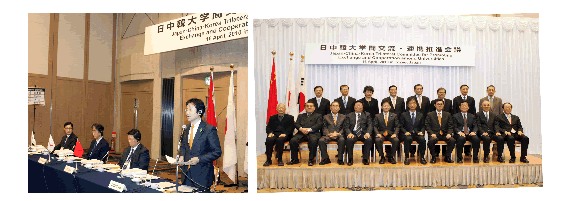
April 16, 2010
1.On April 16, the first Japan-China-Korea Committee for Promoting Exchange and Cooperation among Universities was held in Tokyo attended by committee members from three countries (see Annex). In the Second Trilateral Summit (Beijing, October 10, 2009), Prime Minister Hatoyama had proposed to hold an intergovernmental expert meeting in order to discuss quality-assured exchanges. This committee meeting was held in order to realize his proposal.
2.Mr. Kan Suzuki, Senior Vice-Minister of Education, Culture, Sports,
Science and Technology, Japan, sent his sympathy to China, in response to
the earthquake disaster that struck Qinghai Province in April 14. He expressed
his expectation for fruitful outcome through discussion in the committee,
as it is necessary to provide quality assurance framework for international
competition and cooperation, and to improve quality-assured exchanges.
This
was followed by addresses from three co-chairpersons. Prof. Wu from China
said integration process is going on in many fields including education
in these three countries, and expressed his willingness to draw plans together
for exchange among universities in the future. Prof. Seong from Korea said
education is the source of development for human-being, and that today is
the starting point for a new age of exchange and cooperation among three
countries.
Prof. Anzai from Japan told this is the first time for the
government sector there has been no project like this in the government
for pursuing exchange with quality assurance, and expressed his expectation
that this project will grow involving other Asian countries.
After these
remarks, other committee members gave comments expecting further promotion
of exchanges and cooperation, as well as enhanced practical procedures for
exchange.
3.Following the discussion, agreements were made among the committee members as described below.
(1) Basic summary
Based on the agreement at the Second Trilateral Summit, developing exchange among universities with quality assurance in Japan, China and Korea is of great importance in implementing human resources development on a scale of the whole East Asian region as the economic activities in this region are becoming more and more interrelated.
(2) Title of the project
Through this project, it is expected that universities in Japan, China and Korea will become places where students and professors from diverse cultural and regional backgrounds will be able to come together, and the merits of each university will be realized. Considering the aforementioned, the title of the project has been determined as follows:
Title in English: “CAMPUS Asia”
(Collective Action
for the Mobility Program of University Students)
Title in Japanese:「キャンパス・アジア」
Titles
in Chinese and Korean: (described in the respective languages)
(3) Procedures
This committee meeting will be held in rotation in the three countries in order to steadily realize the project. The second meeting will be held in China in autumn 2010, and the third one will be held in Korea within the first quarter of the year 2011 at the latest, depending on the development of discussion in the working group (to be explained below). The issues to be considered immediately are as follows:
- Mutual understanding on an exchange programs and quality assurance
-
Elaborating the guidelines for exchange programs including credit transfers
and grading policies.
- Implementing a pilot program and identifying necessary
support
- Mutual understanding for university evaluation, publishing a common
glossary of quality assurance, information-sharing on university evaluation,
visiting each other to find out about evaluation activities.
(4) Working groups
In addition to holding this meeting, a Working Group on the Exchange Program and a Working Group on Quality Assurance will be organized. The members of these WGs will be decided by the government, and for the Working Group on Quality Assurance, the representative in charge of the higher education policy of each of the respective governments and the Quality Assurance Agency Committee of Japan, China and Korea (established in March 2010) may possibly be members.
4.As closing remarks, Mr. Suzuki, Senior Vice-Minister, expressed appreciation to all of the committee members for their devoted contribution to the lengthy discussions, and stressed the importance of the activities by three counties for human resources development for all of the East Asian region and hoped for continuous cooperation from each of the members, as well as from the governments of China and Korea.
Annex
Japan:
|
Anzai, Yuichiro ※ |
Chair of the University Council, and Executive Advisor for Academic Affairs of Keio University |
|
Chubachi, Ryouji |
Vice-Chair of Sony Corporation |
|
Terashima, Jitsuro |
Chair of Japan Research Institute, and President of Tama University |
|
Hamada, Junichi |
President of the University of Tokyo |
|
Hirano, Shinichi |
President of the National Institution for Academic Degrees and University Evaluation |
|
Tokunaga, Tamotsu |
Director General of the Higher Education Bureau, Ministry of Education, Culture, Sports, Science and Technology |
China:
|
Wu, Boda ※ |
Director of the China Degree and Graduate Development Center |
|
Wang, Zhanjun |
Deputy Director of the Higher Education Evaluation Center |
|
Yang, He |
Vice-Chair of Peking University Council |
|
Zhang, Zhaodong |
Trustee and Chairman of Founder Group Limited Corporation of Beijing University |
|
Zhang, Xiuqin |
Director-General of the Department of International Cooperation and Exchanges, Ministry of Education |
Korea:
|
Seong, Tae-Je ※ |
Secretary General of the Korean Council for University Education |
|
Yun, Jong Yong |
Executive Advisor of Samsung Electrics Co. Ltd |
|
Lee, Hyunchong |
President of Sangmyung University |
|
Kim, Inn-Se |
President of Pusan National University |
|
Kim, Tae Wan |
President of Korean Educational Development Institute |
|
Song, Ki Dong |
Director General of the International Cooperation Department, Ministry of Education, Science and Technology. |
※ Co-chairpersons
(Total 17 members)
(Higher Education Policy Planning Division, Higher Education Bureau)




